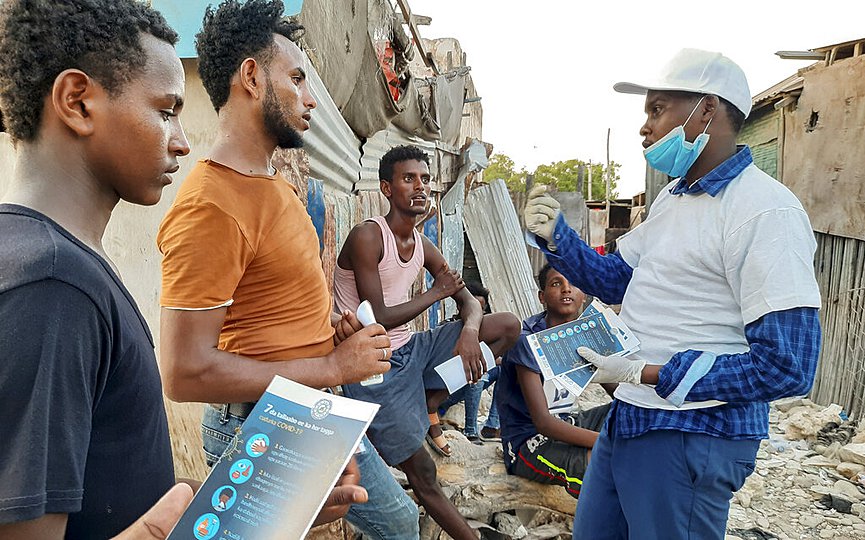General News
Meropi Kyriacou Honored as TNH Educator of the Year
NEW YORK – Meropi Kyriacou, the new Principal of The Cathedral School in Manhattan, was honored as The National Herald’s Educator of the Year.

JOHANNESBURG — A half-year into the most momentous pandemic in decades, it's hard to imagine that anyone, anywhere has not heard of the coronavirus. But scores of migrants arriving in Somalia tell United Nations workers every day that they are unaware of COVID-19.
Monitors for the International Organization for Migration, the U.N. migration agency, interview people at the border in Somalia, a crossroads on one of the world's most dangerous migration routes: across the Red Sea with traffickers, through war-ravaged Yemen and into rich Gulf countries.
The questions for migrants are simple. Origin? Destination? Why are you going? But after the first infections were confirmed in Somalia, a new one was added: How many people in your group are aware of the coronavirus?
In the week ending June 20, just over half — 51% — of the 3,471 people tracked said they had never heard of COVID-19.
"The first time I saw this I was also very shocked," Celeste Sanchez Bean, a program manager with the U.N. agency based in Somalia's capital, Mogadishu, told The Associated Press.
The findings, little more than a line in the agency's reports, are a reminder of the huge challenges in reaching everyone in the world with information about the pandemic, much less getting them to wear face masks.
The migrants are often young men from rural parts of neighboring Ethiopia. Most have no education, and some are from communities where internet access is low, Bean said. She doubted that anything had been lost in translation.
"We've been interviewing migrants for many years," she said.
In past interviews, many migrants were not even aware that a war was being waged in Yemen, the next step on their journey, she said.
With that in mind, "I'm not super shocked that levels of awareness of the coronavirus are still very low."
Instead, she's heartened that the number of those unaware of COVID-19 has been dropping over the dozen weeks that the question has been asked, down from 88% at the start.

Anyone who is unaware of the coronavirus is given a short explanation of the pandemic, including how the virus is contracted and descriptions of the symptoms and preventative measures.
What worries Bean now are the findings of a new project mapping the migrant route through Somalia, a country destabilized by decades of conflict, and merging it with epidemiological data showing coronavirus infections.
"It's very clear to us that migrants are transiting areas with confirmed cases," she said. "When you have migrants with such levels of unawareness, combined with this … I don't want to say dangerous, but the migrants are putting themselves at risk."
Possibly others, too. Migrants already face stigma in cities like Bosaso, where boats set off for Yemen, as some residents blame them for bringing the virus, the U.N. migration agency has said.
Now with the pandemic hurting the local economy, many migrants cannot find the work that allows them to save money for their onward journey, Bean said. "So they are struggling even more than ever before."
Lack of awareness about COVID-19 isn't limited to the migrants.
"I've heard of something that sounds like that name, but we don't have it here," Fatima Moalin, a resident of Sakow town in southern Somalia, told the AP when reached by phone. "Muslims don't contract such a thing."
Others in rural Somalia, especially in areas held by the al-Qaida-linked al-Shabab extremist group, have been dismissive of the virus. Somali authorities cite limited internet access, limited awareness campaigns and even extremists' restrictions on communications with the outside world.
A recent assessment by the U.N. migration agency of displaced people in Somalia's breakaway region of Somaliland found "very high" levels of misunderstanding, with some people confusing COVID-19 with a mosquito-borne disease or thinking a key symptom of the respiratory disease was diarrhea.
But most respondents were aware of the pandemic, thanks largely to radio broadcasts, word of mouth and messages played by mobile phone services while waiting for someone to pick up — a common approach in many countries in Africa.
"Slowly, slowly the information is getting there," Bean said.
The virus is, too. Somalia, with one of the world's weakest health systems, now has more than 2,800 cases.
NEW YORK – Meropi Kyriacou, the new Principal of The Cathedral School in Manhattan, was honored as The National Herald’s Educator of the Year.

KYIV, Ukraine (AP) — Three Russian missiles slammed into a downtown area of the northern Ukrainian city of Chernihiv on Wednesday, hitting an eight-floor apartment building and killing at least 13 people, authorities said.
TORONTO - Toronto Raptors player Jontay Porter was banned for life from the NBA on Wednesday after a league probe found he disclosed confidential information to sports bettors and wagered on games, even betting on the Raptors to lose.
JERUSALEM — Israeli Prime Minister Benjamin Netanyahu said Wednesday his country would be the one to decide whether and how to respond to Iran’s major air assault earlier this week, brushing off calls for restraint from close allies.
WASHINGTON — President Joe Biden said Wednesday he strongly supports a proposal from Republican House Speaker Mike Johnson to provide aid to Ukraine, Israel and Taiwan, sending crucial bipartisan support to the precarious effort to approve $95 billion in funding for the U.
BRUSSELS - European Union leaders over a two-day summit of the special European Council will discuss economic and competitiveness issues in Ukraine, Türkiye, the Middle East and Lebanon, stated Prime Minister Kyriakos Mitsotakis upon his arrival in Brussels on Wednesday night.